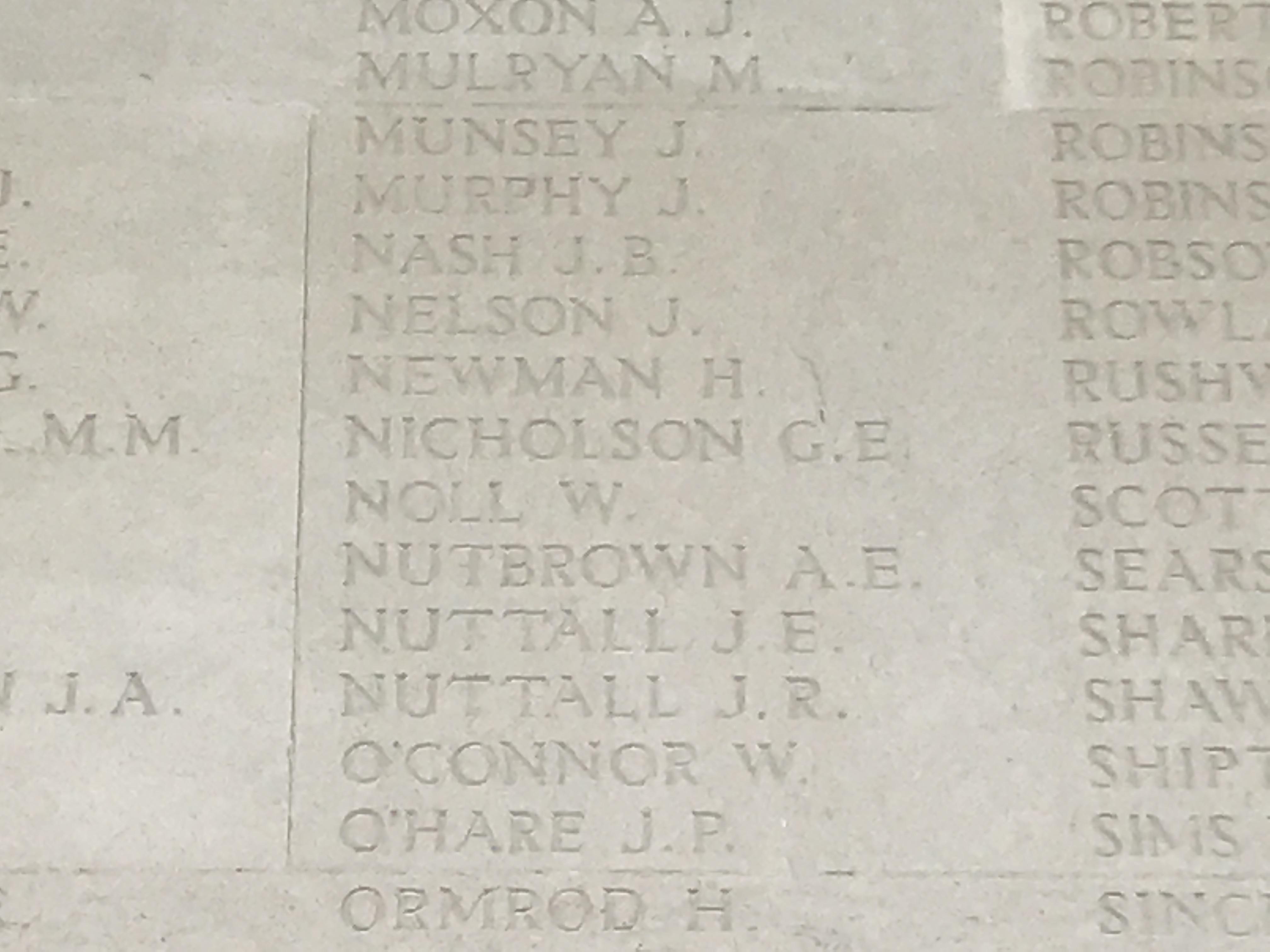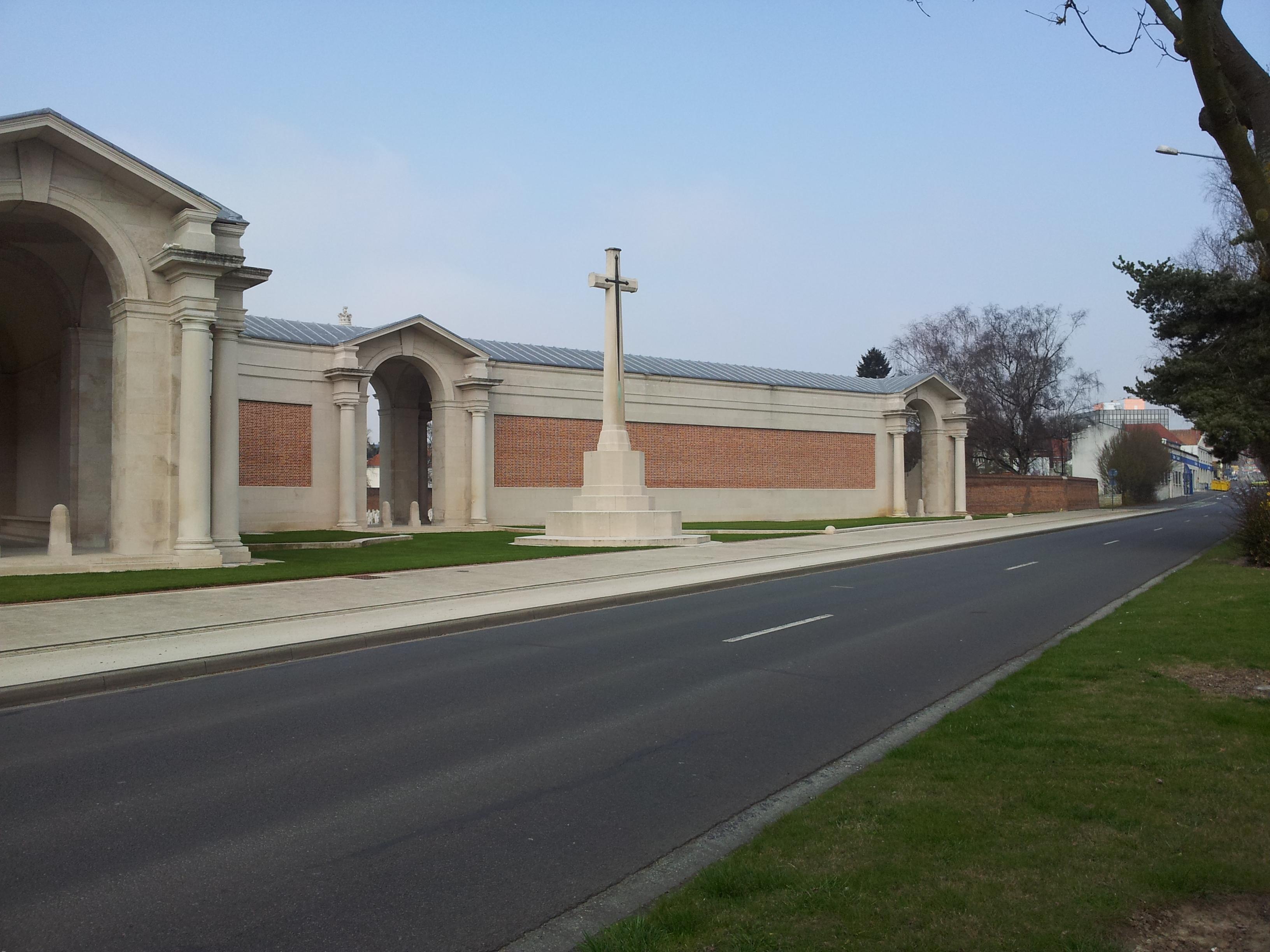Remembrance – George Ernest Nicholson

Today we remember Billingborough Lincolnshire man, George Ernest Nicholson, on the anniversary of his death on this day, 3rd May 1917, serving with the 13th Battalion King’s (Liverpool) Regiment.
George was born in Billingborough in the summer of 1882 to William Nicholson, a farm labourer born in Billingborough in 1857 and his wife Adah Lyne born in Horbling in 1859
They were married 0n 13 June 1882 Billingborough and continued to live in Billingborough having nine children by 1911 although four had died in childhood:-
George Ernest Nicholson, 1882, Billingborough
Albert Edward Nicholson, 1884, Billingborough
Edith Emily Nicholson, 1886, Billingborough (Died)
Minnie Nicholson, 1887, Billingborough
Walter Nicholson, 1892, Billingborough
Herbert Nicholson, 1895, Stow
Maud Nicholson, 1897, (Died)
Alice Grace Nicholson, 1898, (Died)
The family lived at Blackmiles, No 7 vine Street, Billingborough in 1891, possibly moved to Stow in the 1890s. By 1901 George is an 18 year old Yardman agricultural cattle labourer in Dowsby lodging with the Sutton family. He eventually moved back to Billingborough to live with his Aunt and Uncle in Cowgate and is now a 28 year old labourer on the 1911 Census.
George enlisted into the Army at Lincoln, although the exact date is unknown. No known attestation papers survive for George and so his exact enlistment date or dates he moved battalions etc., are currently unknown.
The medals rolls shows that George 48751 of the Kings Liverpool Regiment was not entitled to the 15 star and so know that he did not serve abroad before the end of 1915. The Kings Liverpool rolls show that he was only in that Battalion but the soldier’s Died in the Great war suggests that he was formerly in the Royal Lancaster Regiment 25517, this is at conflict with a newspaper article that suggests that he transferred into the King’s Liverpool from the Notts and Derby Regiment. More research is needed here.
All we do know is that at the time of death he was with the King’s Liverpool Regiment and so to look at his military life we have transcribed the following excerpt from their Battalion Diary. This gives the Battalion movements for the last month of George’s life.
Battalion Diary – 13th (Scottish) Battalion The King’s (Liverpool) Regiment
9th Brigade – 3rd Division
1st April 1917 – Arras
Remained in billets in Arras
2nd April 1917 – Arras
Remained in Billets in Arras
3rd April 1917
Remained in billets in Arras. 2 Officers and about 35 other ranks who were not to go into the attack left Arras for Wanquetin at 9.30pm. This party afterwards moved to St Vaast where they were attached to the 256th G.A. as ammunition carrying party. Orders received for the dumping of stores at Wanquentin to be completed by night of 5th / 6th April.
4th April 1917 – Arras
The battalion moved from its present billets in Arras and were billeted in cellars in town.
5th April 1917 – Arras
Remained in billets up to the 5th.
6th April 1917 – Arras
Remained in same billets
7th April 1917 – Arras
Remained in the same billets. Orders received to move up to the assembly Trenches about 10pm on the 8th.
8th April 1917 – Arras
Battalion commenced to move up to the assembly trenches, by companies at intervals, first company left at 9.10pm and the others at 10 minute interval; Battalion Headquarters established in Iceland Trench. 2/Lieut A Wynne was killed in assembly trenches by a shell.
9th April 1917 – (First day of the Battle of Arras)
At 7am the battalion attacked. The right assaulting company took Harfleur Trench without difficulty, but the left company owing to heavy fire were first unable to enter the trench. The fact that they did so eventually is due to the sound leadership of the officers and the undeniable spirit of the men. Difficulty was experienced in advancing through Tilloy Wood owing to the fact that it was strongly wired, and little of the wire had been cut. Hostile snipers caused a number of casualties owing to their good shooting and good positions, which could not be readily discovered. The barrage put up by our artillery was very effective and greatly assisted men to gain their final objective, i.e. the village of Tilloy by 8.30am.
19 officers and 449 men of the enemy were taken prisoners by this battalion; also 7 machine guns, 2 trench mortars, 1 bomb thrower, and vast quantities of machine gun ammunition in belts, S.A.A bombs and trench mortar ammunition.
The following officers were killed 2/Lieut E G Racine, 2/Lieut E B Flenley and the following were wounded 2/Lieut G K Price, 2/Lieut G Carson, 2/Lieut A E Littler, 2/Lieut L A Bane, 2/Lieut H O Foot, 2/Lieut H G Faragher; casualties in other ranks 170.
Battalion Headquarters moved up to the third German line at 9am.
10th April 1917
At 8.30 am Battalion Headquarters were moved up to the village of Tilloy. About 10pm orders were received to be ready to move up at 15 minutes notice.
11th April 1917
At 2.30am orders received to move up to occupy reserve trenches in from Bois de Boeufs. Battalion Headquarters established in disused German gun-pits.
12th April 1917
Remained in this position as Divisional reserve. Captain H V Briscoe wounded.
13th April 1917
Orders received to move forward to support attack on village of Guemappe; advanced from present position at 2.30pm in artillery formation; order cancelled and battalion returned to original position. At 6pm Battalion moved forward in support to 1st Northumberland Fusiliers in an attack on Guemappe. An intense artillery barrage was put up by the enemy and the Brigade retired a little way and commenced to dig in in a position due south of Wancourt. Lieut A F Robertson and 2/Lieut E M Gardiner wounded; other ranks casualties 40.
14th April 1917
Work ceased about 3am when the battalion was relieved by the KOSB of the 87th Brigade, and marched back to their old position East of Bois de Boefs, arriving at 5am. At 11am companies commenced to march to billets in Arras. Commanding officer commended Battalion on the excellent work done during the attacks.
15th April 1917 – Arras
Billets in Arras. The Battalion was complimented by the Brigadier and also by the Divisional General who thanked them for the exceptionally good work performed by them.
16th April 1917 – Arras
Billets in Arras
17th April 1917 – Arras
Billets in Arras
18th April 1917 – Arras
Billets in Arras. Commanding Officer inspected all companies separately.
19th April 1917 – Arras
Billets in Arras. 3rd Division Gas Corporal inspected the Box Respirators of all ranks.
20th April 1917 – Arras
Billets in Arras. Orders received that Brigade would move to Duisans in the afternoon, but this was cancelled until the 21st.
21st April in 1917 – Arras
Battalion moved to Dusians; first company moving of at 10.30am remainder at 200 yards interval; took over huts from H.L.I. 46th Infantry Brigade; relief completed 1.15pm
22nd April 1917 – Duisans
Battalion remained in Duisans.
23rd April 1917
At 12.30pm orders were received to move about 2pm. Headquarters and first company moved at 2.30pm and remaining companies at intervals of 200yds; took up billets vacated by 7th King’s Shropshire Light Infantry 8th Brigade who had proceeded to the trenches.
24th April 1917
Billets in Arras
25th April 1917
Billets in Arras. Parades under company arrangements.
26th April 1917
Billets in Arras. Parades under company arrangements.
27th April 1917
As on 26th
28th April 1917
Remained in billets in Arras. Baths allotted to Battalion from 7am to 10.30am.
29th April 1917 – Arras
Remained in billets in Arras. Various Church Services held. The attack practiced by the battalion in the afternoon.
30th April 1917
Billets in Arras. Baths allocated to the Battalion from 10am to 1pm. The attack again practiced by the Battalion.
The undermentioned have been awarded the Military Medal for gallantry and good work during the operations from the 9th to 14th April:-
19092 Sergt. Edmondson. C
22132 LCpl Jones J
52330 LCpl Oakes R
51862 LCpl Robinson W
42963 Pte Hunter T
48770 Pte Simms C
1st May 1917 – Arras
The Battalion moved from billets in Arras by companies at intervals of 15 minutes, Headquarters and the first company moving off at 8.15pm to take up positions in the front line trenches.
2nd May 1917
Remained in front line trenches
3rd May 1917
About 1am the Battalion moved to their assembly positions and at 3.45am the two leading companies moved out of the front line trench.
Strong Lewis gun fire was maintained on the enemy’s front line to prevent his escaping the barrage by leaving the trenches.
Notwithstanding the difficulty presented by the darkness which had not lifted, the leading companies hugged the barrage, although assailed by heavy machine gun fire, the attack progressed to a line running North South about 100 yards East of Bois Des Aubepines.
A hostile counter attack was launched at the leading companies from the North and North East. It was completely beaten back, but the line was greatly depleated by machine gun fire and rifle fire from the northern flank and also from a North Westerly direction, which took it in the rear.
A second and strong hostile counter attack which was delivered from the North Flank was met very gallantly, but the line was by this time so thin, no supports having come up that a withdrawl was necessary to prevent the troops being cut off. The withdrawl was carried out in good order in conjunction with the 4th Royal Fusiliers, back to the original front line trench.
The following officers were killed, Captain H E Coates, 2/Lieut H B Williams, the following officers were wounded, Captain J Hunter, Captain G W Byng, 2/Lieut W M Lee, 2nd Lieut H Harris and the following officers were reported missing. Lieut J A Phillips, 2/Lieut A J Innes, 2/Lieut Mc C Daly. 2/Lieut D F Wilkinson was wounded but remained at duty.
4th May 1917
The Battalion continued to consolidate the position held and in spite of heavy hostile fire, made good progress.
This consolidation and holding the line continued until the night of the 11th / 12th of May when the Battalion was relieved by the 10th Battalion Royal Welsh Fusiliers and proceeded to Trenches North of the Cambrai Road. Here they remained in trenches and provided working parties for the line until the 15th when they proceeded to billets for rest and refitting.
George was originally reported as missing although the official records show that he died on the 3rd May 1917.
Grantham Journal Saturday 16th June 1917
BILLINGBOROUGH
MORE SAD NEWS has reached here. Mr Tom Stennett of the Square has been officially notified that his son, Pte A Stennet (Sherwood Foresters) has died of wounds received on April 12th. Nothing has been heard of him since that date, and the parents experienced many weeks of suspense and anxiety. Another son is with the forces in Egypt.
Pte Geo Nicholson (Notts and Derby’s transferred from the K.L.R) has also been reported as missing. Another son, Walter is with the Lincolns. The friends of those heroes have every sympathy.
Commonwealth War Graves Commission:
In memory of Private George E Nicholson, 48751, 13th Battalion, The King’s (Liverpool Regiment) who died on 3 May 1917 Age 36. Son of William and Ada Nicholson, of Burton Lane, Billingborough, Lincs. Remembered with honour, Arras Memorial.
Also remembered on the Billingborough Roll of Honour in St Andrew’s Church.
https://www.southlincolnshirewarmemorials.org.uk/…/george-…/
We will remember them.






Recent Comments